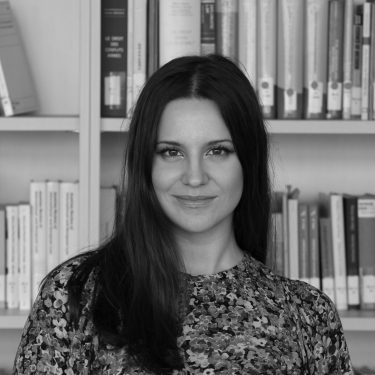Welcome to the latest interview of the Völkerrechtsblog’s symposium ‘The Person behind the Academic’! With us we have Associate Prof. Vladislava Stoyanova, and through the following questions, we will try to get a glimpse of her interests, sources of inspiration and habits.
Welcome Prof. Stoyanova and thank you very much for accepting our invitation!
May I first ask what it was that brought you to academia and what made you stay? What sparked your interest in international refugee and migration law in particular?
When I was a student in Bulgaria at the Law Faculty, Sofia University, I started to work for a legal clinic on a voluntary basis. The clinic focused on refugee law. We worked with refugees, asylum seekers and migrants, which gave me the possibility to directly meet them. We had to do research, including on ECtHR case law since the Bulgarian legislation was restrictive and in some respects in outright violation of the standards established by the ECtHR. This is how I realized the importance of research and its impact on real people. I have to add one more aspect. The director of the legal clinic, Dr. Valeria Ilareva, was – and continues to be – a huge source of inspiration for me.
As to what made me stay, I guess it was my PhD supervisor Prof. Gregor Noll, who is also very inspiring.
What is your greatest disappointment with international refugee law? And in which way(s), do you think that international refugee law is wrongly criticized?
International refugee law does not regulate many important issues, such as access to territory. However, if there is political will, it is possible to find solutions, as the response to the displacement of Ukrainians demonstrated.
If you were not an academic, what would you be?
A lawyer. I actually wanted to qualify as such in Sweden. However, I am already at this stage of my life where I have two kids (10 and 2 years old) and it is very difficult to find time for myself. And I take care of my kids most of the time on my own.
If not a lawyer, I would like to be a fitness trainer or SomaMove trainer. Actually, I still stand the chance of becoming one after my kids grow up a little bit more.
Could you share with us an author that has had a major impact on your perception of justice?
Jordan B Peterson, a clinical psychologist.
Which are three texts that you would wish all academics working on international law would read?
Negotiating Asylum by Gregor Noll, The Morality of Conflict: Reasonable Disagreement and the Law by Samantha Besson and the scholarship of Janneke Gerards, have had a strong impact on me.
What is your favourite place to read and write? What is always near you when you read and write?
My office. I close the door and completely isolate myself from anything else. I have my dark organic chocolate (90 pertain cacao) and protein juice with berries. In this way, I do not have to eat and my body does not use energy to digest food.
What is an energy and inspiration booster, at times when you have none?
The gym – at least one hour per day consistently. And my children!
Have you ever drawn influence from any form of art in your work? Is there anything artistic about writing academic texts on international law?
When I was a high school student, I took drawing classes, and I liked the process of transforming a white sheet of paper into a painting. This implies putting things together, choosing the right colors and making sure that all things properly relate to each other. Writing a paper is quite similar.
Which of your publications is your favourite one? And which of them is your least favourite?
Strangely, one of my very first articles that I published in the beginning of my PhD, is still my favorite. It is also a favorite in terms of title. It is Stoyanova, V., ‘Dancing on the Borders of Article 4: Human Trafficking and the European Court of Human Rights in the Rantsev Case’ (2012) 30(2) Netherlands Quarterly of Human Rights 163.
My forthcoming book Positive Obligations under the European Convention on Human Rights. Within and Beyond Boundaries (Oxford University Press) is also a favourite.
I do not have a least favourite. However, at times, I have agreed to contribute with book chapters that do not contribute much with anything new. I have decided to avoid this.
If you could, which unspoken rule of academia would you instantly erase?
There has been a tendency towards interdisciplinarity, which I am not sure whether I entirely understand, and I am not sure whether we can entirely understand the drivers behind it and its implications. I would not erase it. I have read great interdisciplinary works. Rather, what I do not like is that it is imposed on us from above, including in terms of how funding is distributed.
Have you experienced or witnessed discrimination in academic circles? What do you think would help lessen discriminatory instances in academic circles?
I do not think that I have experienced unlawful discrimination in the context of my working environment. This answer, however, being so abstract is almost meaningless. One would need to specify discrimination on what ground and in relationship to which other groups. If the question is whether I have experienced unlawful discrimination based on my gender, I think the answer is no.
If the question is whether I have experienced some disadvantages related to my gender, the answer should be yes, given that I went through two pregnancies and recovery periods.
Would you like to share with us a ‘sacrifice’ that you have made for your work? Do you regret it?
I have made indeed huge sacrifices for my work. In this sense, my personal and family life has suffered quite a lot. I am always very cautious to frame this as gender bias, but it is difficult for men to accept that women want to have a career and, at the same time, want to have children, and that men have to adjust. I often find myself in a situation where I am blamed for the inevitable negative implications of wanting to have both (career and children).
As to the regret, I have identified points in my life where I wished one Vladislava could make one choice and another Vladislava could make another choice; then we could meet and compare who of the two is happier.
Ideally, whom would you want to find waiting for a meeting with you outside your office next Monday?
My SomaMove trainer.
What are you working on currently? What may we anticipate in the near future?
My forthcoming book Positive Obligations under the European Convention on Human Rights. Within and Beyond Boundaries (Oxford University Press). As to the future, more work on positive obligations can be expected.
Thank you very much, Prof. Stoyanova, for participating in our symposium and for having taken the time to respond to our questions!

Vladislava Stoyanova is an Associate Professor at the Faculty of Law of Lund University (Sweden) and a Land Steiermark Fellow in Law and Innovation at the Centre for Jurisprudence of the Faculty of Law of the University of Graz (Austria).

